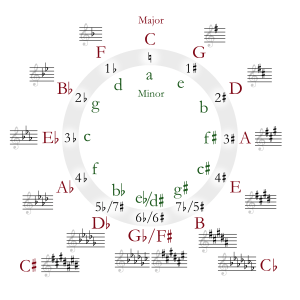B-flat major facts for kids
 |
||
| Relative key | G minor | |
|---|---|---|
| Parallel key | B♭ minor | |
| Notes in this scale | ||
| B♭, C, D, E♭, F, G, A, B♭ | ||
B-flat major is a popular musical scale. It starts on the note B-flat. A musical scale is like a ladder of notes. These notes sound good when played together.
This scale has two 'flats' in its key signature. A key signature is a set of symbols at the start of a piece of music. These symbols tell musicians which notes to play a little lower. The B-flat major scale's relative minor is G minor. Its parallel minor is B-flat minor.
Contents
Why B-flat Major is Great for Instruments
B-flat major is a very useful key for many wind instruments. These include instruments like clarinets, trumpets, and saxophones. It's often their "home key," which means it's easy and natural for them to play in.
Because of this, many songs for concert bands are written in B-flat major. You might have played some of these songs in your school band! Other keys like F major or E-flat major are also often used. They are closely related to B-flat major.
Famous Composers and B-flat Major
Joseph Haydn's Symphony No. 98
Joseph Haydn was a famous composer. His Symphony No. 98 was special. It was one of the first symphonies to use trumpets and timpani (kettledrums) in the key of B-flat major. Haydn's brother, Michael Haydn, actually wrote one earlier.
Joseph Haydn made a clever choice. He wrote the timpani part at its actual pitch. This made it easier for musicians to read and play.
Wolfgang Amadeus Mozart's Piano Concertos
Wolfgang Amadeus Mozart was another amazing composer. He wrote many piano concerti (pieces for piano and orchestra). Five of his piano concerti are in the key of B-flat major.
Well-Known Classical Music in B-flat Major
Many famous classical pieces use the B-flat major key. Here are a few examples:
- Brandenburg Concerto No. 6 by Bach
- Piano Concerto No. 15 by Mozart
- Piano Concerto No. 27 by Mozart
- String Quartet No. 13 by Beethoven
- Piano Sonata No. 29 by Beethoven
- Piano Sonata No. 21 by Schubert
- Piano Concerto No. 2 by Brahms
- Symphony No. 5 by Prokofiev
Understanding Scales and Keys
| Diatonic Scales and Keys | |||||||||||||||||||||||||||||||||||||||||||||||||||||||
|---|---|---|---|---|---|---|---|---|---|---|---|---|---|---|---|---|---|---|---|---|---|---|---|---|---|---|---|---|---|---|---|---|---|---|---|---|---|---|---|---|---|---|---|---|---|---|---|---|---|---|---|---|---|---|---|
|
|||||||||||||||||||||||||||||||||||||||||||||||||||||||
| The table shows the number of sharps or flats in each scale. Minor scales are written in lower case. | |||||||||||||||||||||||||||||||||||||||||||||||||||||||
See also
 In Spanish: Si bemol mayor para niños
In Spanish: Si bemol mayor para niños
 | Delilah Pierce |
 | Gordon Parks |
 | Augusta Savage |
 | Charles Ethan Porter |


